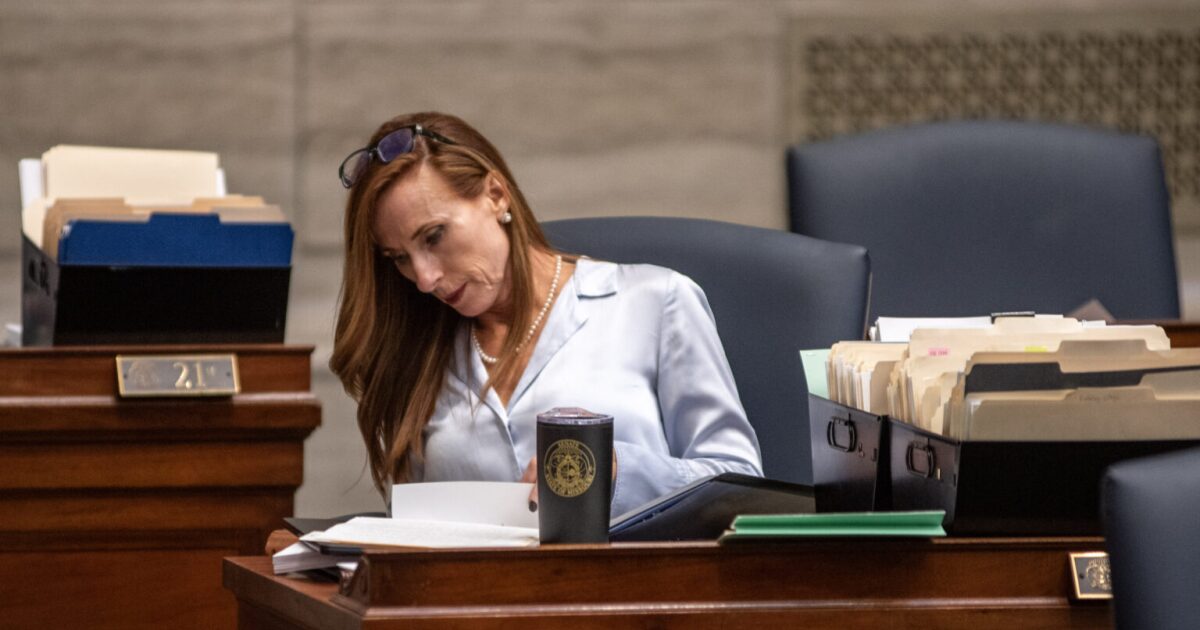Politics
St. Clair County elected officials to get pay increases
Editor’s note: This story was originally published in the Belleville News-Democrat.The St. Clair County Board voted 20-4 at their last meeting to increase elected officials’ salaries starting after the general election, including an 11% raise for the county board chairman.The chairman’s pay hasn’t increased for several years, and the board’s April 29 salary ordinance makes it the same as other elected officials’ pay, according to County Board Chairman Mark Kern.The raises begin Jan. 1, 2025, when the chairman, treasurer, assessor, county clerk, auditor, circuit clerk, coroner and county recorder will all be paid $106,540. The other elected administrative officials were already making over $100,000 but the chairman’s salary was $95,899.County elected officials are up for reelection on Nov. 5. Most of them, including Kern, didn’t have opposition in the March 19 primary.County Board members will also receive raises under the new salary ordinance starting in 2027, when their pay will increase 1.32% to $19,675.The salaries and raises outlined in the ordinance won’t apply to anyone elected to these positions while drawing a pension. They would be paid a salary of only $2,000.During the board meeting, Republican board member Ed Cockrell of District 20 criticized the County Board for approving the pay raises and collecting more tax money from property owners each year.The board also voted April 29 to finalize this year’s tax levy, asking taxpayers for $48.9 million to support the county budget, a 3.74% increase from last year.“Normally this is like 4-4.5%, sometimes even 5%,” Cockrell said of past tax levy increases.One Democrat and three Republican members of the County Board voted no on the proposed pay raises: Scott Greenwald of District 10; Ed Cockrell of District 20; Andy Bittle of District 21; and Kevin Dawson of District 24.Five Republicans voted yes: Michael O’Donnell of District 18; Phil Henning of District 19; Robert Wilhelm of District 26; Matt Smallheer of District 27; and John Coers of District 28.Fifteen Democrats voted yes: Robert Allen Jr. of District 1; G.W. Scott Jr. of District 2; Harry Hollingsworth of District 4; Lonnie Mosley of District 5; Marty Crawford of District 6; Courtney Moore of District 7; Steve Gomric of District 8; Ken Sharkey of District 11; C. Richard Vernier of District 12; Bob Trentman of District 14; CJ Baricevic of District 16; Scott Tieman of District 17; Sue Gruberman of District 22; Jana Armstong Moll of District 23; and Richie Meile of District 25.Three Democrats and one Republican were absent from the meeting: Roy Mosley Jr. of District 3; Ken Easterley of District 9; Stephen Reeb of District 13; and Jerry Dinges of District 15.Lexi Cortes is a reporter with the Belleville News-Democrat, a news partner of St. Louis Public Radio.
Politics
Missouri keeps child marriage legal as push to ban dies in House

Child marriage will remain legal in Missouri for at least another year after Republican House leaders said they don’t have enough time to pass it.
Under current Missouri law, anyone under 16 is prohibited from getting married. But 16 and 17 year olds can get married with parental consent to anyone under 21.
Under legislation that cleared the Senate with virtually no opposition earlier this year, marriage would be banned for anyone under 18. “It was very surprising that the House has not allowed it to come to the body,” said Republican state Sen. Holly Thompson Rehder of Scott City, who sponsored the bill along with Sen. Lauren Arthur, a Democrat of Kansas City.
“Banning child marriage should not be controversial. When I filed this bill, I had no idea it would be controversial,” Rehder added.
The bill was stalled by a group of Republican critics in a House committee, who said it would constitute government overreach and infringe on parental rights. It finally passed out of committee this week after several of those critics were not present at the vote.
But House leadership told reporters Friday morning it was too late to place the bill on the House calendar for debate. Session ends at 6 p.m.
“There’s some interest there, unfortunately the rules preclude us from doing that today,” said House Majority Leader Jon Patterson, a Lee’s Summit Republican.
Arthur said the failure is “shameful.”
“When I talk to people back home, they’re surprised to learn that minors can get married in the first place,” Arthur said. “And these are the kinds of headlines that my friends who are apolitical or live in different parts of the country send me and say, ‘What is happening in Missouri?’
“It makes us look bad,” she said, “but more importantly, we’re not doing enough to protect young girls who are forced into marriages and their lives are worse in every way as a result.”
Twelve other states have in recent years banned child marriage.
Rehder said she was told only around 20 out of 163 House members were opposed. She also said the House could have voted to suspend its rules to allow the bill to be debated and passed before adjournment, but suggested that House Speaker Dean Plocher refused to let the bill move forward to avoid embarrassing Republicans who are opposed to banning child marriage.
“We have the votes,” Rehder said, but it didn’t come up “because the speaker didn’t want to put his members in a bad situation.”
“…Because you shouldn’t be against banning child marriage.”
Rehder said she’s hopeful the bill will succeed next year, in large part due to the “public pressure” of state and national media.
“You cannot sign a legal binding contract in Missouri until you’re 18. But we’re allowing a parent to sign a child into a lifetime commitment. It’s ridiculous.”
Rehder attributed some of the opposition to generational differences.
“People who have been against it — the men who have been against it — who talk to me about it have said, ‘Oh, my grandmother got married at 15.’ Well, yes I did too, mine was 40 years ago,” Rehder said.
“And it didn’t work out because I was operating on not an adult mindset.”
Fraidy Reiss, an activist who founded the nonprofit against forced marriage Unchained at Last was active in testifying in support of the bill in Missouri and has worked nationally to pass similar legislation. Upon hearing the news, Reiss said: “How can legislators live with themselves?”
She added that “dozens of teens will be subjected to a human rights abuse and legally trafficked under the guise of marriage in the coming year,” due to the failure to pass the legislation.
“…How will they explain that to their constituents?”
This story was originally published by the Missouri Independent, part of the States Newsroom.
Politics
Missouri Legislature passes fix to property tax freeze law
One year after they passed the original legislation, Missouri legislators have approved a fix to a law allowing property tax freezes for seniors.Members of the House voted 139-0 Friday to pass the bill. Since it has already gone through the Senate, it now goes to Gov. Mike Parson.The current law allows local governments to pass ordinances that would freeze property taxes for seniors. It also would allow voters to approve such an ordinance.St. Charles and St. Louis counties, as well as the City of St. Louis, have already passed their own ordinances on the issue.The way the law is structured now, only seniors who receive Social Security would be eligible for a property tax freeze. That requirement has left out seniors who are on pensions like police officers and firefighters.Sen. Tony Luetkemeyer, R-Parkville, sponsored both the original bill and the changes this session.“Rather than tying eligibility of the property tax freeze to Social Security eligibility, we instead tied it just to age,” Luetkemeyer said.Rep. Ben Keathley, R-Chesterfield, said the legislature did the first part of the job last year.“Now it’s time to make sure that this language clarifies and we can properly expand this to make sure all our seniors can benefit,” Keathley said.The freeze would still only be applicable in municipalities that have approved an ordinance.One provision that some Democrats wanted to add this session was a means test, under which seniors with higher incomes would not qualify for the freeze.That language was not added to the final bill.
Politics
Missouri legislature passes anti-ranked choice voting resolution

The Missouri legislature has passed a proposed constitutional amendment that, if approved by voters, would prohibit ranked choice voting in most of the state.Members of the House voted 97-43 Friday to pass the resolution. It has already cleared the Senate and does not need the approval of Gov. Mike Parson.The resolution states that under no circumstances “shall a voter be permitted to cast a ballot in a manner that results in the ranking of candidates for a particular office.”The resolution has a carve-out for St. Louis, which implemented an approval voting system in 2020 for its municipal elections.Through this system, voters can select as many candidates as they want in a primary. The top two candidates then go to a runoff election.The proposed constitutional amendment would not affect St. Louis’ system.Rep. Ben Baker, R-Neosho, sponsored the House version of the resolution. He said he was not in favor of the exception for St. Louis.“I’m not OK with it, but this is where we’re at with this language of what we can get done in the body. I think it’s still a big step in the right direction,” Baker said.In speaking against the resolution, Rep. Eric Woods, D-Kansas City, said it was unnecessary and not the way to reassure people about election results.“There are other ways, other systems, other ideas that we can adopt to keep our democracy or our republic, whichever word you want to prefer to use, vibrant,” Woods said.In addition to the ban on ranked choice voting, the resolution states that the candidate who receives the most votes in a political party primary will be the only candidate on the ballot for November for that party.The resolution states that all elections will be by paper ballot or by “any mechanical method prescribed by law.”Included within the proposed resolution is language stating that only U.S. citizens who are 18 or older, residents of Missouri and residents of the political subdivision they vote in are entitled to vote in elections. That language does not make any changes to existing law.Similar language has been a point of contention all session, where it has been in the same conversation as an amendment that sought to make it harder to amend the constitution.Democrats have stated all session this language was being added by Republicans to trick voters into approving it. Senate Democrats filibustered for about 50 hours, eventually killing those proposed constitutional changes.
-

 Entertainment1 year ago
Entertainment1 year agoSt.Louis Man Sounds Just Like Whitley Hewsten, Plans on Performing At The Shayfitz Arena.
-

 Business1 year ago
Business1 year agoWe Live Here Auténtico! | The Hispanic Chamber | Community and Connection Central
-
Board Bills1 year ago
2022-2023 Board Bill 189 — Public Works and Improvement Program at the Airport
-

 Local News1 year ago
Local News1 year agoVIDEO: St. Louis Visitor Has Meltdown on TikTok Over Gunshots
-

 News1 year ago
News1 year agoTed Lasso-inspired pop-up bar now open in St. Louis
-

 Board Bills1 year ago
Board Bills1 year ago2022-2023 Board Bill 165 — Jefferson Arms Community Improvement District
-
Board Bills1 year ago
2022-2023 Board Bill 183 — Amending Ordinance Number 62885 known as the Capital Improvements Sales Tax
-

 News10 months ago
News10 months agoGas tanker crashes into St. Louis Metro transit center





